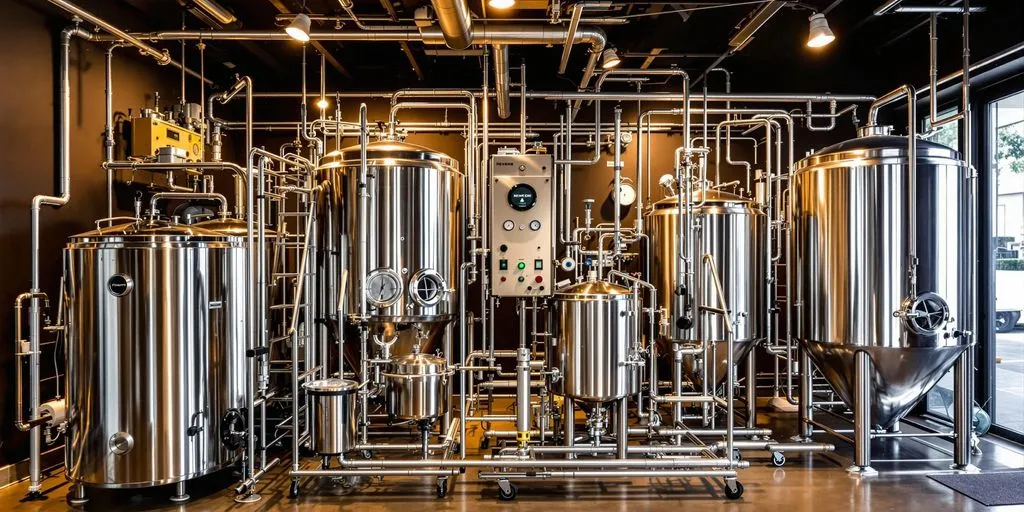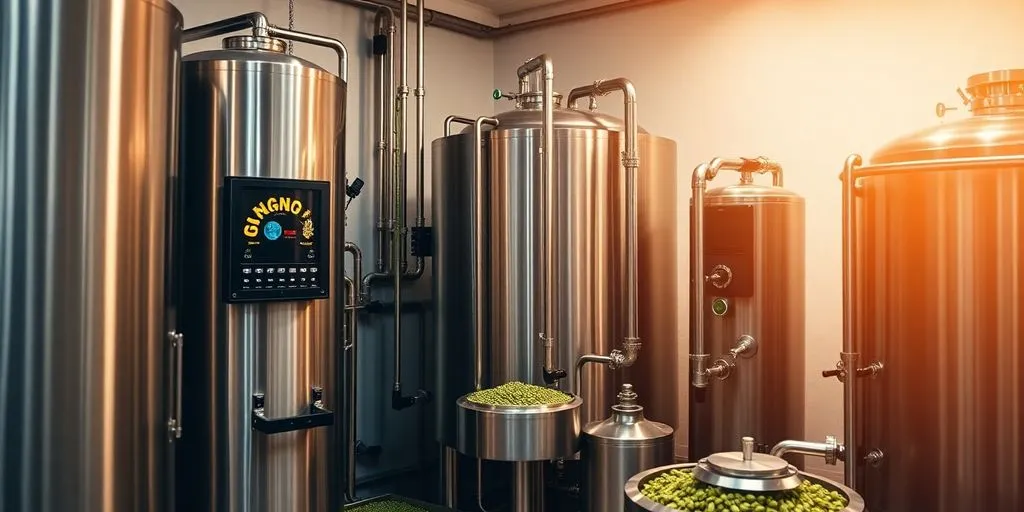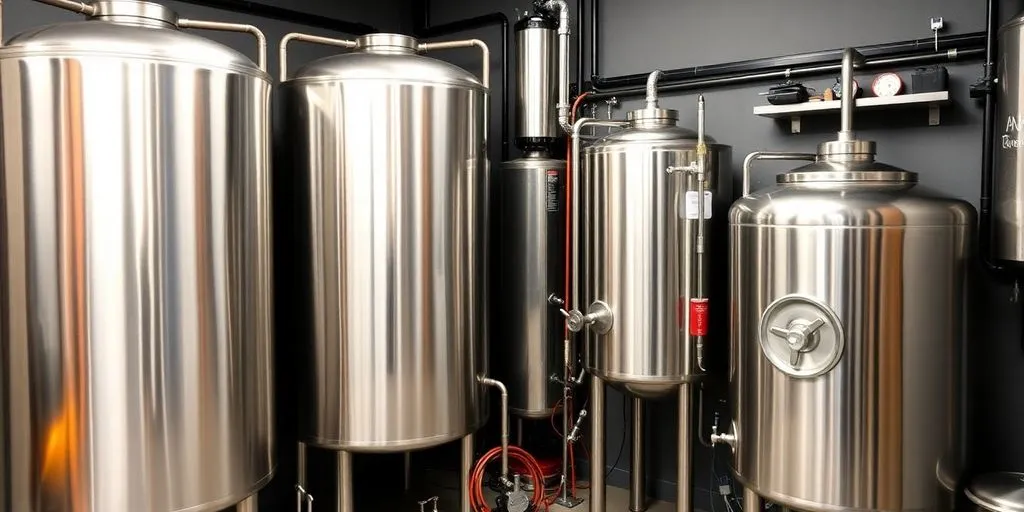When it comes to brewing beer on a small scale, nano brewery equipment stands out as a fantastic choice. These compact systems allow brewers to produce high-quality beer without the need for vast spaces or huge investments. This article will explore the key aspects of nano brewery equipment, including its components, benefits, and how to choose the right setup for your brewing needs.

Key Takeaways
- Nano brewery equipment is smaller and more affordable than traditional brewing systems.
- It offers flexibility and allows for creative brewing on a small scale.
- Choosing the right equipment involves considering space, budget, and brand reputation.
- Regular maintenance is essential to keep your brewing equipment running smoothly.
- Innovations in technology are making nano brewing more efficient and environmentally friendly.
Understanding Nano Brewery Equipment
Key Components of Nano Brewery Equipment
Nano brewery equipment is designed for small-scale beer production. The main components include:
- Brew Kettle: Where the wort is boiled and hops are added.
- Fermenter: A vessel where yeast converts sugars into alcohol.
- Cooling System: Helps to cool the wort quickly after boiling.
- Kegs and Bottles: For storing and serving the finished beer.
Differences Between Nano and Micro Breweries
While both nano and micro breweries produce craft beer, they differ in scale and production capacity. Here are some key differences:
- Production Size: Nano breweries typically produce less than 100 barrels per year, while micro breweries can produce up to 15,000 barrels.
- Equipment Size: Nano equipment is more compact, making it easier to fit in smaller spaces.
- Business Model: Nano breweries often focus on local markets and unique flavors, whereas micro breweries may have a broader distribution.
Benefits of Using Nano Brewery Equipment
Using nano brewery equipment offers several advantages:
- Cost-Effective: Lower initial investment compared to larger setups.
- Flexibility: Easier to experiment with new recipes and styles.
- Quality Control: Smaller batches allow for better quality management.
Nano breweries are a great way to explore creativity in brewing while keeping costs low and quality high.
In summary, nano brewery equipment is essential for those looking to start small in the brewing industry. It provides the necessary tools to create high-quality beer while being compact and efficient. Understanding the key components, differences from micro breweries, and benefits can help aspiring brewers make informed decisions.
Choosing the Right Nano Brewery Equipment
When starting a nano brewery, selecting the right equipment is crucial for success. Choosing the right tools can make a big difference in your brewing process. Here are some important factors to consider:
Factors to Consider When Selecting Equipment
- Size and Space: Ensure you have enough room for your equipment.
- Brewing Capacity: Think about how much beer you want to produce.
- Quality of Materials: Look for durable and high-quality materials.
Top Brands for Nano Brewery Equipment
Some popular brands that offer reliable nano brewery equipment include:
- BrewBuilt
- Grainfather
- Anvil Brewing
Cost Considerations for Nano Brewery Equipment
Budgeting is essential. Here’s a simple table to help you understand potential costs:
| Equipment Type | Estimated Cost Range |
|---|---|
| Brewing Kettle | $200 – $1,000 |
| Fermenter | $150 – $500 |
| Cooling System | $300 – $1,500 |
Investing in quality equipment can lead to better beer and a more efficient brewing process.
By keeping these points in mind, you can make informed decisions that will help your nano brewery thrive!
Installation and Setup of Nano Brewery Equipment

Setting up your nano brewery is an exciting step in your brewing journey. Proper installation is key to ensuring your equipment works efficiently and produces high-quality beer. Here’s how to get started:
Preparing Your Space for Installation
- Choose the right location: Ensure your space has enough room for all equipment and allows for easy movement.
- Check utilities: Make sure you have access to water, electricity, and proper ventilation.
- Clean the area: A clean workspace helps prevent contamination and ensures safety.
Step-by-Step Guide to Setting Up Equipment
- Unpack your equipment: Carefully remove all items from their packaging.
- Follow the manual: Each piece of equipment comes with a manual; follow it closely for assembly.
- Connect utilities: Hook up water and electricity as per the guidelines.
- Test the setup: Run a few tests to ensure everything is functioning correctly.
Common Installation Challenges and Solutions
- Space limitations: If your area is too small, consider a compact setup or rearranging your layout.
- Utility issues: If you lack proper utilities, consult a professional to make necessary adjustments.
- Equipment malfunctions: Always check for defects upon arrival and contact the supplier if needed.
Setting up a nano brewery can be challenging, but with the right preparation and knowledge, you can create a successful brewing environment.
By following these steps, you can ensure a smooth installation process and get your nano brewery up and running efficiently. Remember, a well-prepared space leads to better brewing results!
Maintaining Your Nano Brewery Equipment

Routine Maintenance Tips
To keep your nano brewery running smoothly, regular maintenance is key. Here are some important tips:
- Clean your equipment regularly to prevent buildup.
- Check for leaks and fix them immediately.
- Inspect all parts for wear and tear.
Troubleshooting Common Issues
Sometimes, problems can arise. Here’s how to handle them:
- If your beer isn’t fermenting, check the temperature.
- If there’s a strange taste, inspect your cleaning process.
- For low pressure, examine your gas lines.
When to Upgrade Your Equipment
Knowing when to upgrade is crucial for growth. Consider upgrading if:
- You’re consistently running out of capacity.
- Your equipment is more than 10 years old.
- You want to improve efficiency with new technology.
Regular maintenance not only extends the life of your equipment but also ensures the quality of your beer. Investing in a good CIP (clean-in-place) system can help maintain hygiene and reduce contamination risks.
By following these guidelines, you can ensure that your nano brewery equipment remains in top shape, allowing you to focus on brewing great beer!
Innovations in Nano Brewery Equipment
Latest Technological Advancements
In the world of nano brewing, new technologies are changing how we brew beer. Some of the latest advancements include:
- Smart brewing systems that allow for remote monitoring and control.
- Automated processes that reduce the need for manual labor.
- Compact fermentation tanks that save space while maintaining quality.
Sustainable Brewing Practices
Sustainability is becoming more important in brewing. Nano breweries are adopting practices that help the environment, such as:
- Using renewable energy sources like solar or wind.
- Implementing water-saving techniques to reduce waste.
- Sourcing ingredients from local suppliers to cut down on transportation emissions.
Future Trends in Nano Brewery Equipment
Looking ahead, we can expect to see even more changes in nano brewing. Some trends to watch for include:
- Increased customization of brewing equipment to fit specific needs.
- More focus on healthier brewing options, like low-alcohol or gluten-free beers.
- The rise of experimental brewing systems that allow brewers to try new recipes and processes on a small scale, making it easier to innovate.
The future of nano brewing is bright, with endless possibilities for creativity and efficiency.
By embracing these innovations, nano breweries can stay competitive and meet the demands of modern consumers.
Maximizing Efficiency with Nano Brewery Equipment
Optimizing Brewing Processes
To get the most out of your nano brewery, it’s important to streamline your brewing processes. Here are some tips:
- Plan your brewing schedule to minimize downtime.
- Use automated systems to control temperatures and timings.
- Regularly check your equipment for any issues that could slow you down.
Energy-Saving Techniques
Saving energy not only helps the environment but also cuts costs. Consider these methods:
- Invest in energy-efficient equipment.
- Use insulation to keep heat in during brewing.
- Implement LED lighting to reduce electricity use.
Enhancing Product Quality
Quality is key in brewing. Here’s how to ensure your beer stands out:
- Source high-quality ingredients for better flavor.
- Maintain a clean brewing environment to avoid contamination.
- Regularly taste-test your brews to ensure consistency.
Efficient brewing is not just about speed; it’s about creating the best product possible. Quality equipment can make a big difference in your results.
By focusing on these areas, you can maximize the efficiency of your nano brewery and produce exceptional beer. Remember, the right craft brewing equipment solutions can help you achieve your goals!
Scaling Your Brewery with Nano Equipment
Expanding Production Capacity
To grow your brewery, you need to think about how to increase production without losing quality. Here are some ways to do that:
- Invest in larger fermenters: This allows you to brew more beer at once.
- Upgrade your brewing system: A better system can help you brew faster and more efficiently.
- Hire more staff: More hands can help manage the increased workload.
Adapting to Market Demands
As your brewery grows, you must be ready to meet the needs of your customers. Consider these points:
- Stay updated on trends: Know what types of beer are popular.
- Be flexible with recipes: Adjust your brewing recipes based on customer feedback.
- Offer seasonal brews: Create special beers for holidays or events.
Balancing Quality and Quantity
It’s important to keep the quality of your beer high while making more of it. Here are some tips:
- Maintain strict quality control: Regularly test your beer to ensure it meets your standards.
- Train your staff: Make sure everyone knows how to maintain quality during production.
- Use technology wisely: Invest in equipment that helps monitor and improve quality.
Scaling your brewery is not just about making more beer; it’s about making better beer while meeting customer needs.
By focusing on these areas, you can successfully scale your nano brewery while keeping your product top-notch. Remember, nano brewery equipment includes everything from fermenters and kettles to pumps and hoses. Each piece plays a crucial role in transforming raw ingredients into delicious beer.
Conclusion
In summary, nano brewery equipment is changing the way we think about brewing beer. These small, smart setups let people create high-quality beer without needing a lot of space or money. They are perfect for new brewers who want to try their hand at making unique flavors. With the right tools, anyone can start brewing delicious beer right from their home or a small shop. As more people discover the joys of brewing, nano breweries will keep growing in popularity, making it easier for everyone to enjoy fresh, tasty beer.Contact us to learn more and let our products and services bring you experience like never before!
Frequently Asked Questions
Nano brewery equipment is a small-scale setup designed for brewing beer. It allows brewers to produce smaller batches compared to larger breweries, making it easier to experiment with different flavors.
The main difference is size. Nano breweries are even smaller than micro breweries. They focus on producing limited amounts of beer, often with unique recipes, while micro breweries can produce more.
Using nano brewery equipment lets you create fresh and unique beers. It also requires less space and can be more affordable for new brewers.
Think about the size of your brewing space, your budget, and what types of beer you want to make. It’s also important to look for reliable brands.
Regular cleaning and checking for wear and tear are key. Make sure to follow the manufacturer’s guidelines for care and maintenance.
There are many exciting trends, like eco-friendly brewing methods and smart technology that helps brewers monitor their processes better.
